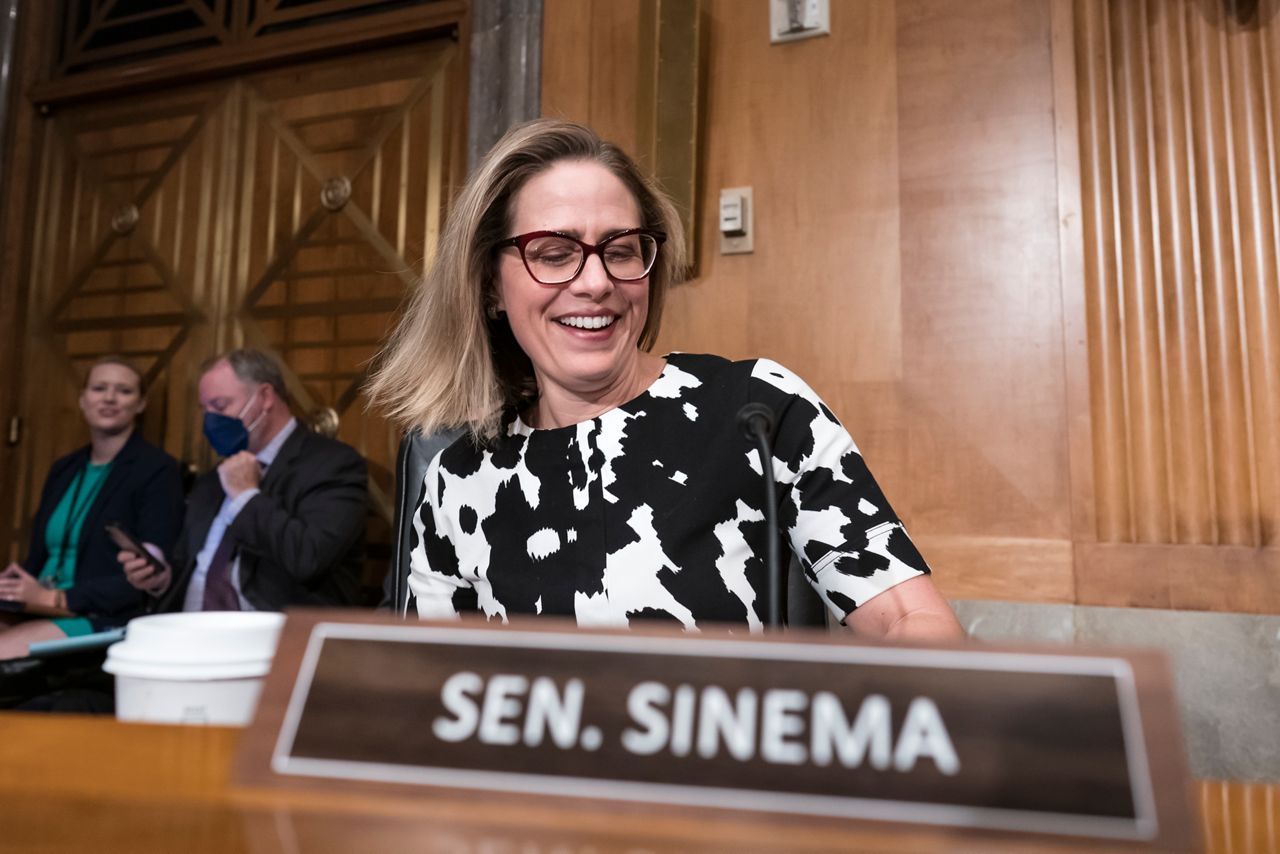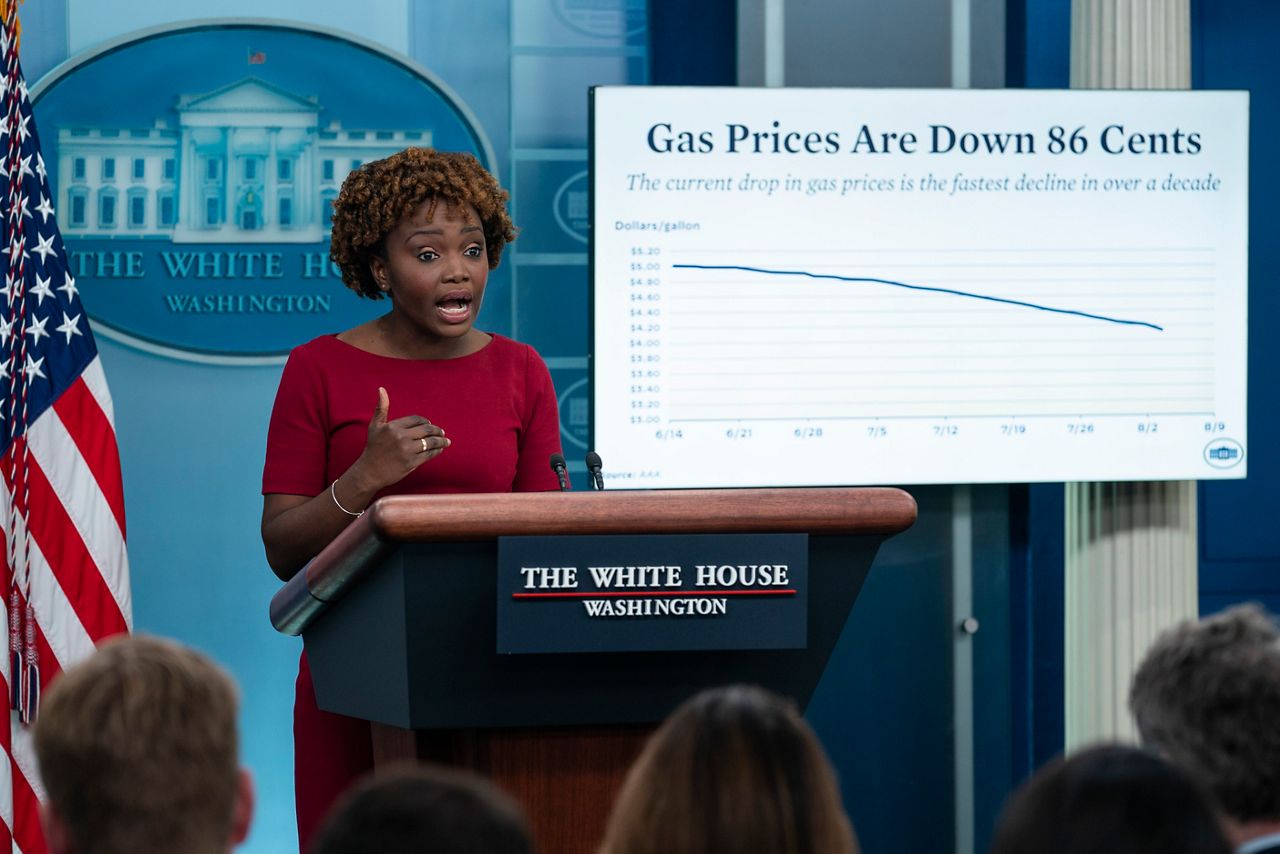The Senate on Saturday evening voted to formally proceed on the Inflation Reduction Act, Democrats’ sweeping climate change, health care and tax bill.
From there, lawmakers embarked on the arduous, lengthy task of considering the measure – voting through the night and into the early hours of Sunday morning on a nearly endless stream of amendments before the final vote on the bill.
All 50 Senate Democrats voted to advance the measure, with all present Republicans opposed. Vice President Kamala Harris cast the tiebreaking vote to formally begin consideration on the bill.
The move came shortly after Senate Majority Leader Chuck Schumer’s office announced that Congressional Budget Office confirmed that the bill meets the chamber’s reconciliation instructions, the process by which certain budgetary measures can pass with a simple majority vote instead of the 60-vote filibuster threshold.
“The time has come for the Senate to begin debate on this historic bill,” Schumer said after releasing the text of the 755-page legislation.
“It will reduce inflation. It will lower prescription drug costs. It will fight climate change. It will close tax loopholes and it will reduce and reduce the deficit,” the New York Democrat added of the package. “It will help every citizen in this country and make America a much better place.”
Democrats beat back a slew of amendments – the vast majority of which were led by Republicans to try and torpedo the measure – as the “vote-a-rama” process stretched through Saturday night and into early Sunday morning.
Some expect Republicans to attempt to strip a provision from the bill that caps the price of insulin at $35, though it is unclear if they will do so.
Schumer said that the amendment process will not dishearten Democrats.
“These efforts will not deter us,” Schumer said on the Senate floor. “No matter how long it takes, the Senate is going to stay in session to finish this bill.”
What’s in the bill?

AP Photo
After more than a year of negotiating, Schumer and West Virginia Sen. Joe Manchin surprised the political world last week by announcing an agreement on the bill, which would lower prices on some prescription drugs, extend Affordable Care Act subsidies for two years, invest $369 billion in fighting climate change and energy production and pay down the federal deficit by $300 billion.
The bill would be paid for by a 15% corporate minimum tax on companies worth $1 billion or more and enhanced IRS enforcement — with the pledge of no new taxes on families making less than $400,000 and no new taxes on small businesses.
The Inflation Reduction Act contains much of what President Joe Biden had called for in his Build Back Better bill, a multi-trillion social spending and climate change bill scuttled by Manchin last December.
The lawmakers got Arizona Sen. Kyrsten Sinema on board with the bill by removing a certain tax provision known as the carried interest loophole from the bill, as well as adding billions in drought resiliency funding.
At a press conference on Friday, Schumer confirmed reports that the new measure will include an excise tax on stock buybacks, which will bring in an estimated $74 billion in revenue – much higher than the $14 billion the carried interest provision would raise. Schumer said that “a good number of progressive legislators” were excited by the new tax on stock buybacks.
“I hate stock buybacks,” Schumer said. “I think they’re one of the most self-serving things that corporate America does. Instead of investing in workers and in training and in research and in equipment, they don’t do a thing to make their company better and they artificially raise the stock price by just reducing the number of shares. They’re despicable. I’d like to abolish them. In fact, [Vemont Sen. Bernie] Sanders and I had legislation to do that.”
Lawmakers spent the better part of Saturday waiting for rulings from the Senate’s parliamentarian, Elizabeth MacDonough, who made decisions on on whether or not key provisions of the bill fit the requirements of the reconciliation process.
MacDonough on Saturday gave the green light to most of Democrats’ prescription drug pricing plan – including letting Medicare negotiate on the price for prescription drugs and capping out-of-pocket expenses – giving the president’s party a win as they start to consider the bill later in the afternoon.
“For the first time, Medicare will finally be allowed to negotiate prescription drug prices, seniors will have free vaccines and their costs capped,” Leader Schumer said Saturday, adding: “We have a bill before us that can win the support of all 50 Democrats,” Schumer added.
The parliamentarian did, however, deal Democrats a minor blow, making remove a provision that would force drugmakers to pay rebates if their prices rise above inflation for products they sell to private insurers. Pharmaceutical companies would have to pay those penalties if their prices for drugs bought by Medicare rise too high.
Schumer acknowledged that MacDonough issued “one unfortunate ruling” by cutting the provision; Oregon Sen. Ron Wyden, chair of the Senate Finance Committee, said that while he was “disappointed” the penalties for higher drug prices for privately insured consumers were dropped, the bill “nevertheless puts a substantial check on Big Pharma’s ability to price gouge.”
The parliamentarian earlier Saturday cleared the clean energy provisions of the bill, including one limiting electric vehicle tax credits to those assembled in the United States. She signed off on a fee on excess emissions of methane, a powerful greenhouse gas contributor, from oil and gas drilling. She also let stand environmental grants to minority communities and other initiatives for reducing carbon emissions, said Senate Environment and Public Works Committee Chairman Thomas Carper, D-Del.
She approved a provision requiring union-scale wages to be paid if energy efficiency projects are to qualify for tax credits, and another that would limit electric vehicle tax credits to those cars and trucks assembled in the United States.
“The Finance Committee’s clean energy tax package adheres to Senate rules, and important provisions to ensure our clean energy future is built in America have been approved by the parliamentarian,” wrote Sen. Wyden in a statement.
“I’m especially pleased that our prevailing wage provisions were approved,” Wyden continued. “These provisions guarantee wage rates for clean energy projects. Clean energy jobs will be good-paying jobs.”
Democrats received a boost last week when the Congressional Budget Office scored the bill, saying that it would indeed cut federal deficits by $102 billion. Adding the roughly $204 billion from IRS enforcement, which the CBO does not officially score, that puts it in line with the $300 billion touted by Schumer and Manchin in their agreement.
Sinema on board

AP Photo/J. Scott Applewhite, File
The Senate announced this week that they would take up the sweeping bill after Arizona Sen. Kyrsten Sinema, the last holdout on the measure, said that she would “move forward” with the measure. She reached a deal to remove a certain tax provision, the so-called carried interest loophole, from the bill, likely giving Senate Democrats the votes they need to pass the bill.
“We have agreed to remove the carried interest tax provision, protect advanced manufacturing, and boost our clean energy economy in the Senate’s budget reconciliation legislation,” Sinema said in a statement. “Subject to the Parliamentarian’s review, I’ll move forward.”
Sinema had also reportedly pushed for drought resilience funding to be added to the sweeping bill. Fellow Arizona Sen. Mark Kelly, along with Nevada Sen. Catherine Cortez Masto and Colorado Sen. Michael Bennet – all of whom are up for re-election in November – announced $4 billion in drought funding late Friday afternoon.
“I am pleased that we have reached an agreement on the Inflation Reduction Act that I believe will receive the support of the entire Senate Democratic conference,” Schumer said at a press conference on Friday. “I’ve had many productive discussions with every member of our caucus over the last few days, and we’ve addressed a number of important issues that they have raised.”
Schumer said that “Sinema said she would not vote for the bill” if the carried interest tax provision was removed, so they “had no choice” but to strike it from the bill.
“Make no mistake: The agreement preserves the core components of the inflation Reduction Act, including reducing prescription drug costs, fighting climate change, closing tax loopholes, exploited by big corporations and the wealthy and reducing the deficit,” Schumer continued. “We’re now one step closer to enacting this historic legislation into law.”
“We’re delivering lower prices on prescription drugs, we’re delivering lower energy costs, including your electric bill going down, and we’re delivering on deficit reduction, as well as tax fairness,” he said. “This is a very, very, very big deal.”
Schumer praised what the measure aims to accomplish and pointed to recent polling which suggests wide support for the bill’s provisions.
“With this bill, we’re going to put our country on track to meet the climate goals we need to preserve for a planet for the sake of our children and our grandchildren,” Schumer said. “With this bill, we’re going to use the purchasing power of Medicare to ensure America’s seniors have affordable access to life saving medicines they need. The anguish of people having to pay, not being able to pay for medicines that may save their lives will be greatly reduced. And with this bill, we are going to deliver our promise to close loopholes exploited by big corporations in the wealthy.”
“But simply, this legislation will save lives,” he said. “Create jobs, reduce costs, and reduce inflation, just what the American people want.”
In an interview with Spectrum News on Friday, Labor Secretary Marty Walsh warned that the effects of the bill might not be felt by the average American for several months.
“I think it will be several months, probably like six months before they actually feel the impact,” Walsh told Spectrum News’ Taylor Popielarz. “One provision of that is that by allowing Medicare … to be able to debate and negotiate down lower prices for prescription drugs, that won’t happen overnight, but that will return a lot of money – particularly to our seniors in this country – back in their pocket.”
“Then you have also some climate resiliency work that’s going on there,” he continued. “You have a tax change that’s going to see money coming back into the American economy quick that’s going to reduce the deficit. So there’ll be some parts that I think it’ll be six months for the whole bill is working the way it needs to be.”
The long road ahead: Debate, vote-a-rama, more

AP Photo/Meg Kinnard
Despite the support of the united Democratic caucus, the bill still faces several hurdles going forward.
Assuming universal Republican opposition, the measure needs the support of all 50 Senate Democrats, along with Vice President Kamala Harris’ tie breaking vote, in order to pass the bill using the chamber’s budget reconciliation process, which allows for certain measures to pass with a simple majority instead of the 60-vote filibuster threshold.
All 50 Democratic Senators must be present, which could prove difficult amid the COVID-19 pandemic. A number of lawmakers have tested positive and missed time in the chamber in recent weeks; the Senate does not allow for proxy voting.
Once the bill is officially introduced, brought to the Senate floor and debated, the “vote-a-rama” process begins, during which lawmakers can propose and vote on any number of amendments to the measure before moving to a final vote. Many of these amendments are political messaging proposals that can slow down the process and force members of the opposing party to make difficult choices.
Republicans pledged that they would make this vote-a-rama very difficult for Democrats.
“What will vote-a-rama be like? It’ll be like hell,” Sen. Lindsey Graham, R-S.C., said Friday. “They deserve this.”
Sen. John Thune, R-S.D., a member of Senate GOP leadership, pledged “hard” votes, with the goal of trying to win the support of Sens. Sinema or Manchin on amendment votes to try and change or sink the bill.
But Manchin on Saturday indicated that he won’t go along with Republican amendments, relling reporters: “I’m protecting the integrity of the bill.”
“Look, they’re going to do lots of amendments,” Schumer said of his Republican colleagues. “We don’t know what else they will do. But … as I said, I believe we will have 50 votes to pass this legislation at the end of the day.”
Following Senate passage, the House of Representatives will return from recess on Friday, Aug. 12 to give final passage of the bill, Majority Leader Steny Hoyer, D-Md., announced Friday.
A full-court press from the White House

White House press secretary Karine Jean-Pierre speaks during a briefing at the White House, Wednesday, Aug. 3, 2022, in Washington. (AP Photo/Evan Vucci)
The White House in recent days has put on a full-court press to tout the bill’s benefits for the American people and popular support for its provisions.
The Biden administration on Saturday issued a formal statement of support on the measure: “The Administration strongly supports passage of the Inflation Reduction Act of 2022. This legislation would lower health care, prescription drug, and energy costs, invest in energy security, and make our tax code fairer—all while fighting inflation and reducing the deficit.”
“This historic legislation would help tackle today’s most pressing economic challenges, make our economy stronger for decades to come, and position the United States to be the world’s leader in clean energy,” the Biden administration continued. “In all, the bill would reduce the deficit by more than $300 billion, including near-term deficit reduction that, according to a range of economic experts, would also reduce near-term inflation. In addition, lower costs for prescription drugs, health care, and energy would help reduce inflation, while giving American families more breathing room.”
At a briefing on Friday, White House press secretary Karine Jean-Pierre touted a letter from more than 40 major companies, including Lyft, Unilever, Logitech, Ford and Levi Strauss & Co., calling for Congress to quickly pass the bill “because it will combat inflation, lower prices for Americans, invest in manufacturing and transition our country to a clean energy economy,” the backing of a bipartisan group of former EPA administrators and the support of the U.S. Conference of Mayors.
Also Friday, the White House touted the support of former Republican California Gov. Arnold Schwarzenegger, who wrote in his newsletter that while he doesn’t love every aspect of the bill, the measure makes him “hopeful” and urged Congress to pass it.
“The biggest investment any country has ever made in clean energy is a big f****** deal,” Schwarzenegger wrote.
On Thursday, President Biden convened a roundtable of labor and business leaders to highlight the importance of passing the bill, saying it “meets the needs of working families and [is] what our economy needs now for stronger, sustained economic growth in the years ahead.”
“The Inflation Reduction Act will mean we’re making the largest investment ever in clean energy and American energy security,” Biden said, emphasizing: “Largest in our history.”
“And it will be the largest in American manufacturing as well,” Biden added, when coupled with the Chips and Science Bill Congress recently passed that he will sign next week.
“I think it’s important to underscore that this legislation is fiscally responsible,” Treasury Secretary Janet Yellen said. “It will actually reduce the deficit by hundreds of billions of dollars over time. And by reducing deficits, we’ll be complementing the work the Federal Reserve and the Administration is doing to combat inflation, even as we address these cost pressures like health care, prescription drugs and energy.”
General Motors CEO Mary Barra said that the bill “will help drive further investments in American manufacturing and sustainable, scalable, and secure supply chains. And all that comes with that is a stronger economy and job growth.”
“This is going to deliver fundamental economic change across America,” said AFL-CIO president Liz Shuler. “This bill as a major step forward. It’s going to improve the lives of working people. It’s going to improve lives for seniors who are trying to pay for their prescriptions, kids who are going to have a healthier planet to live on.”
The White House on Wednesday shared a series of polls showing the bill has popular support from the American people, as well as a statement from five former Treasury Secretaries — from both Democratic and Republican administrations — strongly backing the bill.
The Associated Press contributed to this report.




